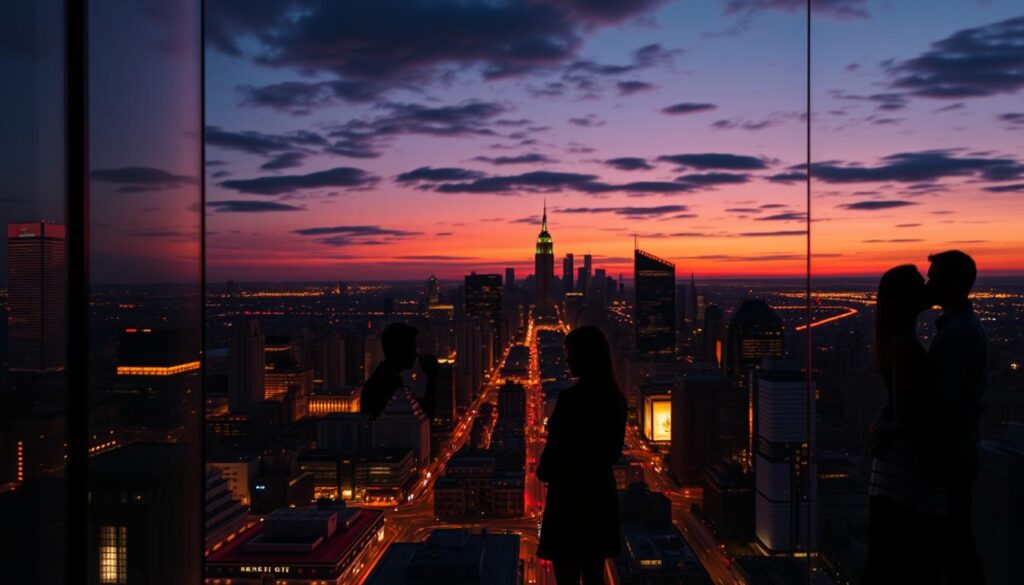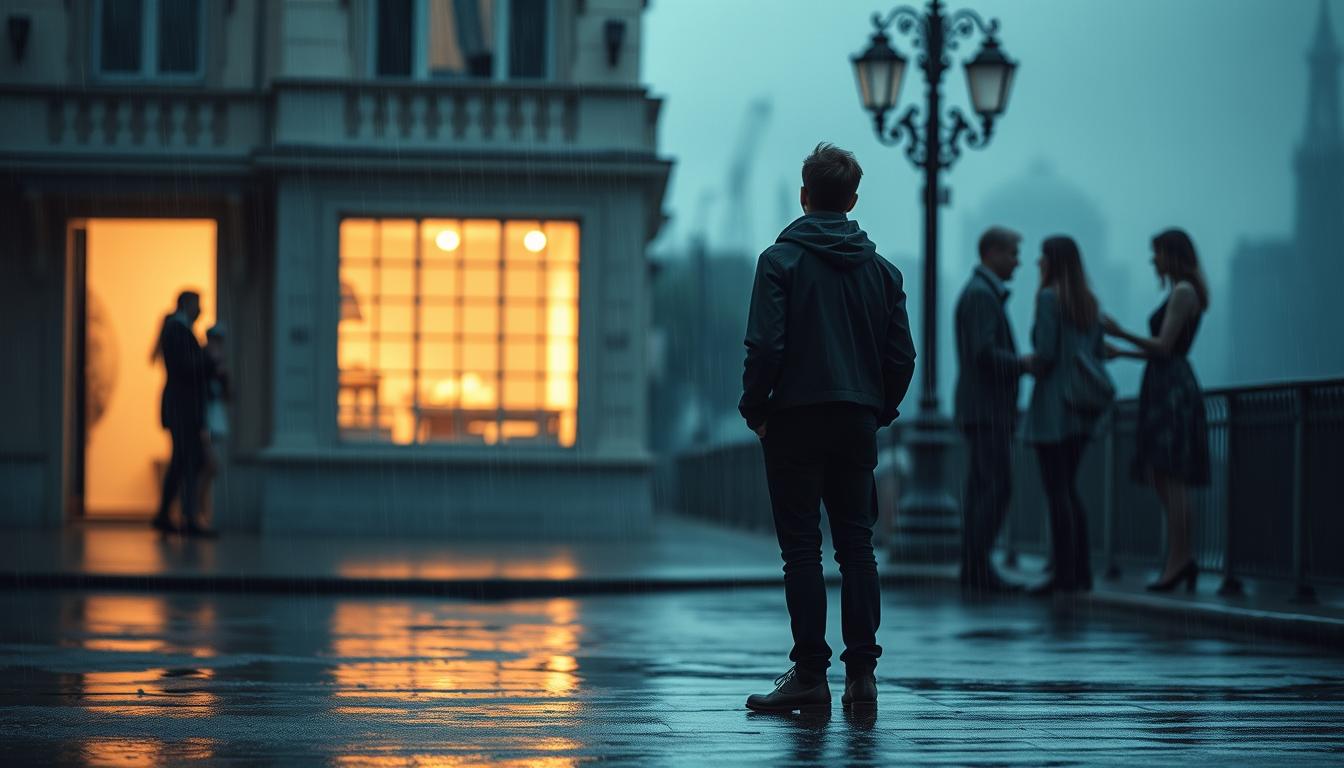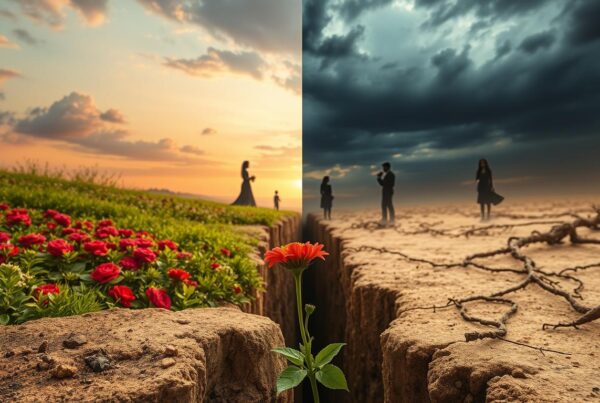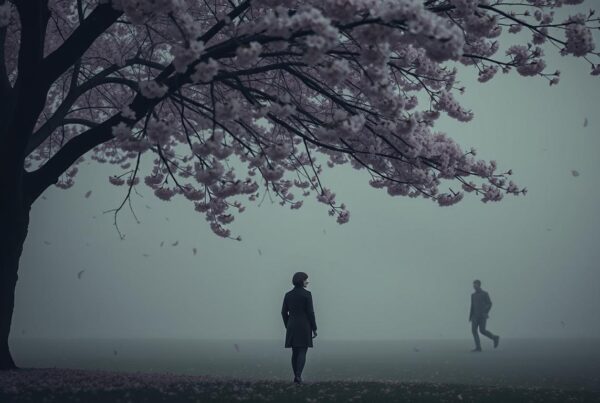For centuries, unrequited love stories have touched our hearts. They show the deep pain of loving without being loved back. These stories are found in both old and new tales, showing the universal pain of unreciprocated love.
Studies show how unfulfilled love affects us deeply. Literary reviews also show its lasting impact in stories. Cultural studies highlight how these stories touch people all over the world.
Understanding Unrequited Love
Unrequited love is when one person deeply loves another who doesn’t feel the same. This is a big part of human feelings. We will look at what it is, when it happens, and how it affects people.
Defining Unrequited Love
It’s when someone deeply loves another but gets no love back. Many studies have looked into this. They show how big the gap can be between the lover’s feelings and the other’s lack of care.
At its core, it’s about loving someone who doesn’t love you back. This leads to constant longing and yearning.
Common Scenarios
One-sided love happens in many ways, especially in relationships. Studies have shown common cases, like loving a friend or someone who’s already in a relationship. Experts like John Gray and Dr. Helen Fisher talk about the emotional pain it causes.
Psychological Impact
Unrequited love can deeply hurt a person’s mind. Studies show it can lower self-esteem, cause anxiety, and even depression. Loving someone who doesn’t love you back can lead to a cycle of hope and sadness.
It’s important to understand these effects. This helps people deal with the ups and downs of loving someone who doesn’t love back.
The Emotional Rollercoaster of Unrequited Love
Unrequited love is a deep emotional journey many face. It has different stages filled with strong feelings.
Initial Infatuation
The journey starts with infatuation. The person you love becomes everything to you. You feel admiration and passion, wanting them to feel the same.
This phase brings highs that make every small thing from them seem huge.
Heartache and Sorrow
But then, reality hits, and love grief sets in. Feeling that your love might not be returned is hard. It brings deep sadness and sorrow.
The Hope that Lingers
Even with the pain, hope in love stays alive. This hope can be both comforting and painful. It keeps the heart hoping for a change in feelings.
Research shows this hope is about our need for connection and acceptance. It makes unrequited love a complex but common experience.
Historical Narratives of Unrequited Love
Exploring unrequited love through history is like diving into timeless stories. These tales show how deeply this feeling has touched humans. They span cultures and ages, found in books and myths.
Classic Literature Examples
Classic books are full of stories about unrequited love. William Shakespeare’s “Romeo and Juliet” is famous for love, but also shows unrequited love through Rosaline. Jane Austen’s “Pride and Prejudice” has Mr. Collins loving Elizabeth Bennet, showing this theme in many stories.
Mythological References
Mythology is full of stories about unrequited love. The tale of Narcissus and Echo is a sad example. Narcissus loved himself, ignoring Echo’s love, leading to their tragic end.
The story of Orpheus and Eurydice is another example. Their love was doomed by fate. These myths show the pain and lasting nature of unrequited love, inspiring many works.
The Role of Unrequited Love in Modern Media
Modern love stories grab our attention with complex tales of unrequited love. They appear in books, TV shows, movies, and music. These stories make us feel empathy and deep emotions.

Books and Novels
Books and novels share many stories about unrequited love. They explore the emotional and psychological sides of one-sided romance. For example, “Normal People” by Sally Rooney shows the depth of unreciprocated feelings, touching many readers.
TV Shows and Movies
Romantic dramas on TV and in movies show the pain of unrequited love. Shows like “La La Land” and “Marriage Story” show the complexity and sadness of unreciprocated feelings. These stories connect with viewers, showing the hope and sorrow of one-sided love.
Music and Lyrics
Love songs express unrequited love in a powerful way. The music world fills with ballads that show the deep emotions of unreciprocated love. Songs like Adele’s “Someone Like You” and Billie Eilish’s “Wish You Were Gay” share these feelings through lyrics, touching listeners.
Real-life Stories of Unrequited Love
This section shares real-life stories of unrequited love. These stories come from interviews, autobiographies, and public confessions. They show both everyday people and famous celebrities, highlighting the wide reach and deep impact of unfulfilled love.
Personal Experiences
Personal stories of love often show deep and strong feelings. Memoirs and interviews reveal the hidden emotions and silent wishes of unrequited love. They cover everything from young people’s first heartbreaks to older folks looking back on missed chances at love.
Celebrity Stories
Celebrity love stories put a spotlight on unrequited feelings. Even famous people like Taylor Swift and Leonardo DiCaprio face unfulfilled love. Their stories in the media add to the public’s interest and show that love’s challenges affect everyone.
Psychological Theories Behind Unrequited Love
Unrequited love can feel overwhelming. It’s often linked to different psychological theories. These theories help explain why some people fall deeply in love without getting anything back. Knowing these theories can help both those who feel this way and those who watch it happen.
Attachment Theory
Attachment theory helps us see how our early life shapes our adult relationships. People with insecure attachment styles might fall for those who don’t love them back. This is because they fear being rejected.
Rejection Sensitivity
Rejection sensitivity makes people very sensitive to being rejected. This can make unrequited love even harder to bear. Those who are very sensitive to rejection might see signs of rejection where there are none. This can lead to a cycle of longing and sadness.
Limerence Explained
Limerence is a strong, all-consuming attraction to someone. It’s marked by deep longing and constant thoughts of the person. This can happen in unrequited love, where the person believes they might be loved back, even when they’re not.
Looking into attachment styles, rejection sensitivity, and limerence helps us understand unrequited love better. This knowledge can help people heal and be more understanding of those who are struggling with unrequited love.
Coping Mechanisms for Unrequited Love
Dealing with unrequited love can feel like a big burden. But, there are ways to handle it. Using the right strategies can help you heal and find support.
Building Emotional Resilience
Being strong emotionally is key when you’re dealing with unrequited love. Start by facing your feelings and getting stronger. Self-help books say doing things that make you feel good about yourself helps a lot.
Seeking Support Systems
Support from others is very important. Talk to friends, family, or a therapist who can offer help. They can guide you and make healing faster.
Practicing Self-Care
Self-care is vital for your mind and heart when you’re feeling down. Activities like exercise, meditation, and hobbies can bring joy. Regular self-care helps you heal and deal with unrequited love.
The Pain of Longing: Delving into Unrequited Love Narratives
Unrequited love is a theme found in many stories. It touches hearts deeply. Think of Shakespeare’s sonnets, Pablo Neruda’s poetry, and Adele’s songs.

Looking at these stories shows us how they affect us. They show the pain and hope of unreturned love. These tales are both sad and beautiful, helping us feel better.
These stories help us grow and learn about ourselves. They show how to face our feelings and find strength. Creators use unrequited love to explore deep emotions, making their stories relatable.
Unrequited love stories teach us about human feelings and love’s lasting power. They show that love’s pain can also spark creativity and self-understanding. These stories mix sorrow and beauty, making us think about our own love stories.
The Impact of Unrequited Love on Mental Health
Unrequited love can deeply affect a person’s mental health. It can lead to many challenges. It’s important to understand these effects to help and recover.
Symptoms of Depression and Anxiety
Unrequited love can cause depression symptoms. These include feeling sad all the time, losing interest in things, and changes in eating or sleeping. Anxiety in love can make you worry a lot, feel restless, and have trouble focusing.
Experts say knowing these signs is key. It helps you get help when you need it.
Strategies for Recovery
There are ways to deal with the mental health effects of unrequited love. Being part of a supportive community is crucial. This can be friends or groups focused on mental health.
Experts suggest doing things that make you strong. This includes hobbies, mindfulness, and staying healthy. These can help with depression and anxiety.
Many people have overcome unrequited love. Their stories show recovery is possible. By using recovery strategies, you can improve your emotional health and self-esteem.
The Paradox of Unrequited Love
Unrequited love is a mix of joy and pain. It’s often seen as a deep sorrow. Yet, it can spark creativity and insight.
A Source of Creativity
For many artists, writers, and musicians, unrequited love is a deep well of inspiration. It fuels art, from sonnets to symphonies. Heartache can unlock creativity, studies show.
The Long-term Effects
Unrequited love shapes our views on love and relationships. It makes us more sensitive to love and teaches us about emotional strength. Though it leaves scars, it also teaches valuable lessons.
The Cultural Significance of Unrequited Love
Unrequited love is a common feeling worldwide. It shows how different cultures see love and relationships. Looking at unrequited love helps us understand various social views and stories.
Different Cultural Perspectives
Love is seen differently in every culture. In Western societies, it’s often shown in movies and books, showing deep, sad feelings. In Japan, unrequited love is seen as noble and beautiful.
Stories of unrequited love vary across cultures. In Bollywood, it shows the strength of love. In Africa, it’s about family and community, not just personal feelings.
Social Interpretations
Societies have their own ways of seeing love. In some places, arranged marriages mean unrequited love is frowned upon. This is because family ties are more important than personal feelings.
Today, social media and books change how we see love. In the West, it’s about growing as a person. In other places, it’s about family and community.
Unrequited love shows how personal feelings meet societal rules. It gives us a deep look into how people deal with love and longing.
Unrequited Love and Personal Growth
Unrequited love can be a deep experience. It often leads to personal growth. People can find ways to grow and feel empowered.
Lessons Learned
Self-awareness is a key lesson from unrequited love. People learn about their feelings and what they truly want. This knowledge helps them grow and do better in future relationships.
Transformative Experiences
Heartache from unrequited love can start a journey of change. It pushes people to try new things and see the world differently. This journey can lead to a more fulfilling life.
Famous Works Inspired by Unrequited Love
Unrequited love has inspired many famous works. William Shakespeare’s “Romeo and Juliet” is a great example. His own heartache likely influenced the tragic story of the lovers.
This piece shows how art can touch people for generations. It’s a powerful reminder of the impact of unrequited love.
Adele’s album “21” is another example. Her music speaks to listeners all over the world. She shares her heartache and rejection openly.
Her music is real and emotional. It helps people who feel the same way. It shows how personal stories can become art.
Visual arts also show the power of unrequited love. Vincent van Gogh’s paintings are full of longing and sadness. His feelings for women are often talked about in his art.
His paintings show how personal feelings can lead to great art. These stories show the lasting impact of unrequited love on art and literature.



